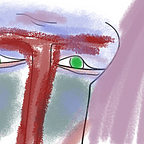How are anxious people different?
I was always hyperactive, restless, and full of emotion and sensitivity to things, especially when I was most anxious and most alone. The cliche of the lonely artist is real because when one is alone, they feel more. When people fall out of society, they get more intrigued by human emotion more, because they want to understand it. Everyone experiences this often in their lives, there’s nothing special about anxious people. Anxious people may experience it more, and have a sensitivity to art because they have a hard time expressing themselves and belonging in real life — And as always, it is a spectrum.
I had a journey with medications that made me feel different parts of me as a human, some of them made me relate to “normal people” in coffee shops and the library more, the way they can sit and pay attention to their own thing, not feeling incomplete. The way they don’t continuously scan their environments, and look at people’s faces while they’re working, writing, or reading. The way they don’t feel flight or fight whenever they say goodbye to someone or think about goodbyes and being alone with their thoughts.
Today, I am lowering down an SSRI that I’ve been taking for a month, but I am keeping taking Ritalin, an ADHD stimulant.
Ritalin is giving me more panic attacks now that I lowed the dose of the SSRI (antidepressants), but it stopped after a while. I would say there are 3 phases in my life: The anxious phase, the Normal phase (With a heavy SSRI and laziness), and the Best Stress phase.
Changing your brain chemicals using SSRI changes not only your behavior, but also your opinions on things, on people, your irritability level is low so you like more things, and you hate fewer things. You don’t want to be unique anymore. You don’t look for validation from strangers anymore. Normal or slightly upsetting things don’t ruin your day.
When I was a kid, I loved looking at strangers in any place and feeling acknowledged but mainly when they don't pressure me to talk to them or don’t acknowledge me heavily back.
Before and after the SSRI
It was so easy for me to feel emotions, I used to be restless all the time. At 8 p.m. I loved to dance, I loved to scatter my attention: To listen to a podcast while playing a game, etc. After I took an SSRI, I was comfortable with silence. I no longer needed to hear someone talking in the form of podcast, video, or to learn anything. I was comfortable to simply play a game, to let silence flow with people, because the silence is important. But I know, for a fact, that before, the silence used to bug me, and I had to learn something, share something, from the media or the people I am with.
When I was drowning in anxiety, I felt the need to blog, write, think, to read: Simply existing was uncomfortable.
Before SSRI, I used to get easily overwhelmed by my senses: I used to listen to indie music because it was quieter. I used to hate content that showed rich people doing rich things, because it was stressful and unattainable, like hot girls and fancy cars and houses on Instagram Reels. But after I was medicated, it was all of a sudden possible for me to get those cars: They became a motivation. This might explain the anxiety levels of the people who are comfortable watching productivity gurus and coaches as opposed to others. Your anxiety levels, the levels of serotonin in your brain, affect what you consume, your likes and dislikes, interests, major, job, relationship partner, what you think about, how often you think about certain things, how often you think in general, and other things that are hard to mention all at once.
The normal phase was when I started taking SSRIs that give me extra serotonin, they radically changed my behaviors. Social media no longer just ruined my day (I quit using it from how crippled it used to make it). In this phase, I did not care to feel intensely, I did not feel as intensely. I did care about the pointlessness of the universe or the inevitability of death. I was finally able to do my assignments and readings, so it didn’t matter. I belonged to society more easily, so I didn’t look for anything else. This is where the “normal” or “Standard” personality types fall in society, and they are what keeps things functioning, thankfully. I was at my best during this phase. I understood the need to do small talk in the elevator, to do compliments, to say hi to neighbors. It was easy for me to watch a conversation on tv and understand how silence is important in each instance. How the act of giving a gift, visiting a friend, was normal, and how it was good for society. It used to make me scared to my knees. Turns out, it’s all about anxiety, all these things. Traditions and niceties made sense to me, in fact, they came naturally to me. I finally fit in.
The Best Stress phase was when I lowered my SSRI dose in half and kept taking Ritalin. It was because it was making me zombie-like when I am left alone and after 4–5 p.m. In this phase, I dealt with anxiety again, but it was the healthy stress. It kept me on my feet, kept me sparkling, but still took away the cripliness of talking to authority figures and people with sunglasses in general that I kept functioning.
